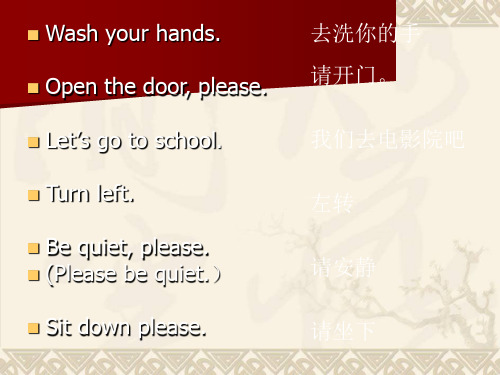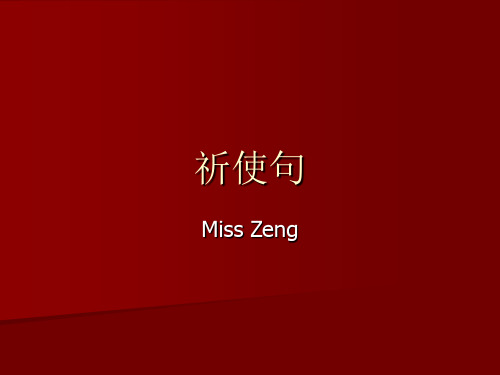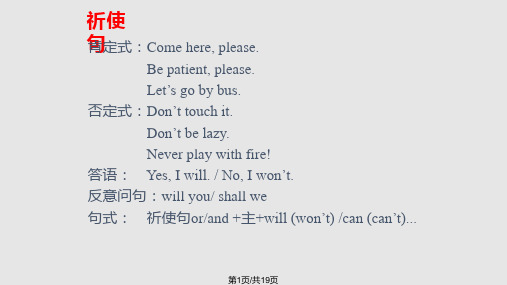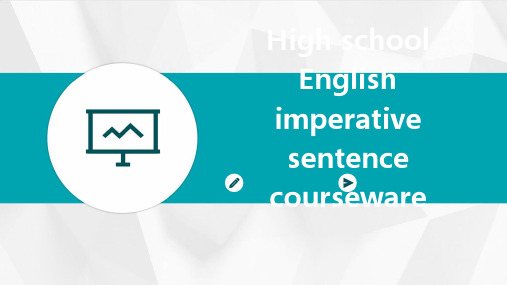英语课件高三英语祈使句[www
合集下载
2019高中英语语法——祈使句(31张PPT)教育精品.ppt

Can you tell me what are imperatives?
主语 ,主语you常______ 祈使句无_____ 省去 ;
原形 谓语当,句首加_____ Don’t 变否定; 动词_____
Are the following sentences imperative? (discuss in pairs)
这一句式也可以演变为“名词 性短语+and+简单句”的形式。
More time, and I could have done it better. 如果多给我一些时间,我可以做得更好。
3.祈使句的附加疑问句
you?/(won’t you) Open the door, will ___________________? Open will you Don’t Don ’t forget, _________________? Let us go there, ______________? will you Let’s Let’s go there at once, __________? shall we
go, keep, look, ride, stop, stay, watch out
out for pedestrians (行人). 5.Watch _________ Look behind you before you turn 6. ______ right or left. Don’t stay in the middle of the road. 7. __________
They give instructions
Don’t Don’t stop. turn left. / No / No left parking turn.
英语语法课件---祈使句

祈使句的结构:肯定形式
④ No+名词 / 动名词
例子: (1) No smoking! (2) No spitting! (3) No litter!
祈使句的结构:否定形式
① 动词原形引导的否定形式是在句首加don’t
例子: (1) Don’t make any noise! (2) Don’t open the window. (3) Don’t come next Monday.
A. Not
B. Don’t C. To not D. Not to
D ( ) 9. _________ your hands before the meal.
A. Washing
B. Washed
C. To wash
D.
WAash
( ) 10. Let me ______ a look at your new schoolbag.
A( ) 1. _______ your homework here tomorrow.
A. Bring
B. Brings C. To bring D. Bringing
B( ) 2. _______ late again, Bill!
A. Don't to be
B. Don't be
C. Not be D. Be
例子: (1) (You) wait here for a moment. (2) (You) go and tell him. (3) (You) be quiet!
祈使句的注意事项
② 有时祈使句的主语也可以是everybody, somebody, anybody, nobody 等不定代词
例子: (1) Stand up, everybody! (2) Come in, everybody! (3) Nobody move.
英语祈使句pptPPT 课件

him not go. 别让他走。
•
3. 有些可用no开头,用来表示禁止性的祈使句。
如:No smoking! 禁止吸烟!No fishing! 禁止钓鱼!
• 祈使句,无主语,只要动词就可以; • 表示请求或命令,加上please表客气; • 如果变成否定句,Don’t开头是旋律; • NO talking !是警示,祈使用法要
No parking
Be quiet
Let’s do exercise.
1. Jim, _____ me a hand.
A. gives B. is giving C. will give D. give
2. ____ careful, Jenny! There is a tree in front of you.
牢记!
轻松小练习
1.咱们一起玩吧 2.请不要迟到. 3.回答这个问题. 4.打开窗户
1. Let's play together!
2. 3. 2.Don't be late.
4. 3.Answer this question.
5. 4. Open the window
Guessing Game Turn left!
肯定祈使句的结构如下: Do (动词原形) sth,please.
Don't wash your hands. Don't open the door,
please. Don't turn left. Don't be quiet, please. (Please be quiet.) Don't sit down please.
4. _____ get off the lorry until it stops. A. Do B. Can’t C. / D. Don’t
英语祈使句(秀秀)ppt

4. —____ higher, and you will see the house.
—OK.
A. If you stand
B. To stand
C. When you stand D. Stand
5: ----- Call me when you get home,
------Ok, _______.
Answer this question. 4.打开窗户
Open the window. 5:下次小心点。
Be careful next time.
第一关:Let’s Read
➢ Don’t throw things at the monkeys. ➢ Don’t feed the animals. ➢ Don’t walk on the grass. ➢ Don’t take photographs here. ➢ Don’t leave rubbish .
A: I must B: I can C: I will D: I may
6. Please ___ do it. A. he B. let him C. let he D. him
7. _____ let anyone open the door. A. Don't B. Will C. Not D. No
• 上学不要迟到!
• Don't be late for school! • 2. Let型的否定式有两种: ①: Don't + let + 宾语 + 动词原形 + 其它成分 ②:Let + 宾语 + not + 动词原形 + 其它成分” 如:别让他走
Don't let him go. / Let him not go. 3. 有些可用no开头,用来表示禁止性的祈使句。如:禁 止吸烟! 禁止钓鱼!
祈使句课件PPT课件

5. The job might match your skills. (改 为否定句) The job_m_i_g_h_t _n_o_t match your skills.
第16页/共19页
第17页/共19页
第18页/共19页
感谢您的观看!
第19页/共19页
3. While I was trying to sleep, there was a knock at the door. (同上) I was trying to sleep__w_h_e_nsomeone k_n_o_c_k_e_d_ at the door.
第15页/共19页
4. I haven't decided when I shall leave.(改 为简单句) I haven't decided__w_h_e_n_t_oleave.
8.He didn’t succeed until he tried the___t_w_e_l_fth(十
二)time.
9. People often hurt themselves by __f_a_ll_in_(gfall)
off chairs.
10. Be careful with _k_n__iv_e_s (刀子). 11. Don’t jump from too high a __h_e_i_g_ht(高度). 12. Please _t_u_r_n__o_ff_ (关掉) the light before you
A. If you listen
B. Listening
C. when listen
D. Listen
第10页/共19页
5. ______ English with you is a lot of fun!
第16页/共19页
第17页/共19页
第18页/共19页
感谢您的观看!
第19页/共19页
3. While I was trying to sleep, there was a knock at the door. (同上) I was trying to sleep__w_h_e_nsomeone k_n_o_c_k_e_d_ at the door.
第15页/共19页
4. I haven't decided when I shall leave.(改 为简单句) I haven't decided__w_h_e_n_t_oleave.
8.He didn’t succeed until he tried the___t_w_e_l_fth(十
二)time.
9. People often hurt themselves by __f_a_ll_in_(gfall)
off chairs.
10. Be careful with _k_n__iv_e_s (刀子). 11. Don’t jump from too high a __h_e_i_g_ht(高度). 12. Please _t_u_r_n__o_ff_ (关掉) the light before you
A. If you listen
B. Listening
C. when listen
D. Listen
第10页/共19页
5. ______ English with you is a lot of fun!
英语语法——祈使句 (共28张ppt)

祈使句
Guessing Game
Guessing Game
Guessing Game
Guessing Game
Guessing Game
Guessing Game
Guessing Game
Read and observe(观察)
Turn left!
Don’t smoke!
Turn right!
祈使句
• 祈使句,无主语, 只用动词就可以. • 表示请求或命令, 加上please表客
气。
• 如果变成否定句, Don’t开头是规 律。
• 肯定回答I will, 否定回答 I won’t.
in class
Can you talk about the rules with Imp来自rative sentences?
Don’t play football here!
Go upstairs!
Don’t park your car!
Go downstairs!
Please don’t eat here!
Please park here! Don’t pick the flowers!
祈使句一般用来表示请求、命令、劝说、 号召、警告等。在祈使句中, 通常省略 第二人称主语you。肯定式以动词原形开 头,否定式一般在动词原形前加don’t。
注意:
“No+名词/动词⁃ing形式”表示禁止或
规劝,常用于公共场所。
e.g. No photos!
禁止拍照!
No smoking! 禁止吸烟!
将下列句子翻译成英语。 1. 请看这幅图画。
2. 不要在教室里跑。
3. 让我们帮助他。
4. 在图书馆保持安静。 5. 上课不要迟到。
Guessing Game
Guessing Game
Guessing Game
Guessing Game
Guessing Game
Guessing Game
Guessing Game
Read and observe(观察)
Turn left!
Don’t smoke!
Turn right!
祈使句
• 祈使句,无主语, 只用动词就可以. • 表示请求或命令, 加上please表客
气。
• 如果变成否定句, Don’t开头是规 律。
• 肯定回答I will, 否定回答 I won’t.
in class
Can you talk about the rules with Imp来自rative sentences?
Don’t play football here!
Go upstairs!
Don’t park your car!
Go downstairs!
Please don’t eat here!
Please park here! Don’t pick the flowers!
祈使句一般用来表示请求、命令、劝说、 号召、警告等。在祈使句中, 通常省略 第二人称主语you。肯定式以动词原形开 头,否定式一般在动词原形前加don’t。
注意:
“No+名词/动词⁃ing形式”表示禁止或
规劝,常用于公共场所。
e.g. No photos!
禁止拍照!
No smoking! 禁止吸烟!
将下列句子翻译成英语。 1. 请看这幅图画。
2. 不要在教室里跑。
3. 让我们帮助他。
4. 在图书馆保持安静。 5. 上课不要迟到。
祈使句ppt课件

请根据括号内的要求, 改写下列句子, 每空一词(含缩写)。 1. Get up earlier, or you will miss the
early bus. (改为同义句) _I_f you_d_o_n_'_t get up earlier, you will miss the early bus.
4. I haven't decided when I shall leave.(改为简单句) I haven't decided_w_h_e_n_ t_o_ leave.
5. The job might match your skills. (改为否定句) The jobm__i_g_h_t n__o_t match your skills.
祈使句的反意疑问句
反意问句 Open the door, will you? Let’s go by bus, shall we? Let the boy go first, will you?
一个重要句型
祈使句, and/then 主can/will do… 祈使句, or 主语 cannot/ won’t do… Examples: 1) Think hard, and you will come up with an
注意: Let's型祈使句,其否定式也可用 Let’s not … 如: Let's not have rest. 咱们别休息了。 Let's not sit here! 我们不要坐在这儿!
祈使句的答语
Tom: Remember to turn off the light ! John: I will. Tom: Don’t forget your homework! John: I won’t. Tom:Don’t come to school late again! John: Sorry, I won’t.
祈使句公开课课件PPT课件

第7页/共16页
二.祈使句的肯定句式 祈使句的肯定句式一般分为以下三种类型: 1.行为动词原形+其它成分。 例如:Make sentences after the model.根据例句 造句。
Have a good time. 愿你玩得痛快。
2. Be动词+其它成分(形容词、名词或介词短语等) 。 例如:Be careful when crossing the street.过马 路时要小心。
1.在祈使句的肯定句式前加Don’t,构成『Don’t +行为动词原形+其它成分』。Don’t say that again!别再那样说了!
2.在Be动词引起的肯定祈使句前加Don’t,构成『 Don’t be+其它成分(形容词、名词或介词短语等) 』。注意:在这种句型中be不能省略;否定副词 not不可置于be之后。 例如:Don’t be careless.不要粗心。
Let’s take a walk after supper, shall we?晚饭后我们
去散步,好吗?
第11页/共16页
五.祈使句的应答句
祈使句的动作是未发生的动作,常用I will.来回答 其肯定式,表示愿意接受请求或命令,用I won't.来回答 其否定式。另外,常用All right. / OK. / Yes, let's... / A good idea.等来回答Let's...句式,表示接受建议;用 You may. / You can.等来回答Let us...句式,表示允许 或同意。 [原题再现]
第9页/共16页
3.Let的宾语是第一人称时,否定式为宾语后加not ; let的宾语是第三人称时,否定式常为let前加 don't。如: Let's not waste time. 咱们别浪费时间了。 Don't let them make any noise. 别让他们吵。
二.祈使句的肯定句式 祈使句的肯定句式一般分为以下三种类型: 1.行为动词原形+其它成分。 例如:Make sentences after the model.根据例句 造句。
Have a good time. 愿你玩得痛快。
2. Be动词+其它成分(形容词、名词或介词短语等) 。 例如:Be careful when crossing the street.过马 路时要小心。
1.在祈使句的肯定句式前加Don’t,构成『Don’t +行为动词原形+其它成分』。Don’t say that again!别再那样说了!
2.在Be动词引起的肯定祈使句前加Don’t,构成『 Don’t be+其它成分(形容词、名词或介词短语等) 』。注意:在这种句型中be不能省略;否定副词 not不可置于be之后。 例如:Don’t be careless.不要粗心。
Let’s take a walk after supper, shall we?晚饭后我们
去散步,好吗?
第11页/共16页
五.祈使句的应答句
祈使句的动作是未发生的动作,常用I will.来回答 其肯定式,表示愿意接受请求或命令,用I won't.来回答 其否定式。另外,常用All right. / OK. / Yes, let's... / A good idea.等来回答Let's...句式,表示接受建议;用 You may. / You can.等来回答Let us...句式,表示允许 或同意。 [原题再现]
第9页/共16页
3.Let的宾语是第一人称时,否定式为宾语后加not ; let的宾语是第三人称时,否定式常为let前加 don't。如: Let's not waste time. 咱们别浪费时间了。 Don't let them make any noise. 别让他们吵。
高中英语祈使句课件ppt

总结词Imperative Sentences
否定祈使句的构成和使用
详细描述
否定祈使句通常用于表达强烈的禁止或不满,语气比较强 硬。它们通常在需要强调某项规则或要求时使用,例如在 课堂管理或团队规范中。
详细描述
否定祈使句通常以"Don't"或"Never"开头,后面跟着动 词原形,表示禁止或不建议做某事。例如,"Don't be late again"表示不要再次迟到。
高语言转换能力。
内容
提供多个中英文祈使句,要求学 生将其进行互译。
示例
"请打开窗户。" 可以翻译为 "Please open the window."
Writing Practice
01
02
03
目的
通过写作练习,让学生能 够正确地使用祈使句来表 达指令或请求,提高写作 表达能力。
内容
给出一些场景或主题,要 求学生使用祈使句进行写 作,可以是短文、段落或 句子。
总结词
表示命令、请求或强烈建议
详细描述
不使用助动词或动词,直接使用名词、形容词等词类表达命令、请求或强烈建议 ,例如"Open the door!"
The usagendicates a request, suggestion, or command
sentences
总结词
总结词
省略主语和动词be的祈使句的构成和 使用
省略主语和动词be的祈使句的语气和 语境
详细描述
在某些情况下,祈使句的主语和动词 be可以被省略,使得句子更加简洁有 力。例如,"Have a good day!"表示 祝你一天愉快!
祈使句公开课课件PPT课件

如果他明天来这儿的话,叫他给我来 个的强调形式通常在肯定
祈使句式前加上助动词Do(Do在句 中无意义)。 例如: Do shut up!快住口!
Do be careful. 务请小心。 Do come on time. 务必请准 时来。
第15页/共16页
把它留给我吧,我想想有没有办法。 Hurry up, or we’ll be late.快点,否则我们 要迟到了。
第13页/共16页
七.祈使句与条件状语从句的连用 祈使句与条件状语从句连用时,条件状语 从句可置于祈使句前或后。 例如:Tell him to make a phone call to me if he comes here tomorrow.
名词/V-ing形式』结构,表示『禁止做某事』。例
如:
NO Photos!禁止拍照!
No Entry禁止入内!
No Passing禁止通行! No Smoking禁止吸烟!
第10页/共16页
四.祈使句的反意问句
祈使句的反意疑问句须按其句子结构及讲话人的语气来决定 其疑问部分。通常有以下三种形式:
1.祈使句为肯定句式,其反意疑问句表示请求时,通常用will you;表示邀请、劝说时,用won’ t you。 例如:Be sure to write to us, will you?你一定要给我们写信 ,好吗?
第7页/共16页
二.祈使句的肯定句式 祈使句的肯定句式一般分为以下三种类型: 1.行为动词原形+其它成分。 例如:Make sentences after the model.根据例句 造句。
Have a good time. 愿你玩得痛快。
2. Be动词+其它成分(形容词、名词或介词短语等) 。 例如:Be careful when crossing the street.过马 路时要小心。
祈使句式前加上助动词Do(Do在句 中无意义)。 例如: Do shut up!快住口!
Do be careful. 务请小心。 Do come on time. 务必请准 时来。
第15页/共16页
把它留给我吧,我想想有没有办法。 Hurry up, or we’ll be late.快点,否则我们 要迟到了。
第13页/共16页
七.祈使句与条件状语从句的连用 祈使句与条件状语从句连用时,条件状语 从句可置于祈使句前或后。 例如:Tell him to make a phone call to me if he comes here tomorrow.
名词/V-ing形式』结构,表示『禁止做某事』。例
如:
NO Photos!禁止拍照!
No Entry禁止入内!
No Passing禁止通行! No Smoking禁止吸烟!
第10页/共16页
四.祈使句的反意问句
祈使句的反意疑问句须按其句子结构及讲话人的语气来决定 其疑问部分。通常有以下三种形式:
1.祈使句为肯定句式,其反意疑问句表示请求时,通常用will you;表示邀请、劝说时,用won’ t you。 例如:Be sure to write to us, will you?你一定要给我们写信 ,好吗?
第7页/共16页
二.祈使句的肯定句式 祈使句的肯定句式一般分为以下三种类型: 1.行为动词原形+其它成分。 例如:Make sentences after the model.根据例句 造句。
Have a good time. 愿你玩得痛快。
2. Be动词+其它成分(形容词、名词或介词短语等) 。 例如:Be careful when crossing the street.过马 路时要小心。
祈使句公开课课件

感谢您的观看!
第16页/共16页
名词/V-ing形式』结构,表示『禁止做某事』。例
如:
NO Photos!禁止拍照!
No Entry禁止入内!
No Passing禁止通行! No Smoking禁止吸烟!
第10页/共16页
四.祈使句的反意问句
祈使句的反意疑问句须按其句子结构及讲话人的语气来决定 其疑问部分。通常有以下三种形式:
1.祈使句为肯定句式,其反意疑问句表示请求时,通常用will you;表示邀请、劝说时,用won’ t you。 例如:Be sure to write to us, will you?你一定要给我们写信 ,好吗?
2.祈使句为否定句式,其反意疑问句通常只用will you。 例如:Don’t smoke in the meeting room, will you?不要在 会议室抽烟,好吗?
3. Let开头的祈使句构成反意疑问句时,除Let’s用shall we外
,其它均用will you。
例如:Let the boy go first, will you?让个那男孩先走,好吗?
Guessing Game
Turn left!
第2页/共16页
Guessing Game
Turn right!
第3页/共16页
Guessing Game
Don’t smoke! No smoking!
第4页/共16页
Guessing Game
Don’t park your car! No parking!
二.祈使句的肯定句式 祈使句的肯定句式一般分为以下三种类型: 1.行为动词原形+其它成分。 例如:Make sentences after the model.根据例句 造句。
祈使句ppt

Eg: Just a moment. (名词短语)
Quiet,please ! (形容词短语) Faster!Faster! ( 副词短语)
5.祈使句+or+简单句,表示….否则…. 祈使句+and+简单句,表示…就…..
Eg: Be quick,or we’ll be late. 走快点,否则我们要迟到的。
A.do B.didn’t C.did D.don’t
5.Stand over there, _B____ you’ll be able to
see it better.
A.or B.and C. but
6.Lose one hour in the morning.___C___ you
will be looking for it the rest of the day.
翻译下列各句
1.咱们一起玩吧! Let's play together!
2.请不要迟到. Don't be late.
3.回答这个问题. Answer this question.
4.我来打开窗户好吗? Shall I open the window ?
5.你和我们一起去好吗? Will you go with us ?
Eg:Shall I go to a park this afternoon? Shall we read books together?
2)主语是第二人称的时候,可以借助助动词 will来表示。
Eg: Will you help him?
7.表示祈使句的词组:
1.Be careful!小心! 2.Stand up/down.起立/坐下。 3.Be quiet. 安静! 4. come here. this way走这边. 7.Don’t be late.别迟到。 8.Don‘’t be noisy. 不要喧哗。 9.No smoking. 禁止吸烟。 10.No parking. 禁止停车。 11.Look out!小心 !
Quiet,please ! (形容词短语) Faster!Faster! ( 副词短语)
5.祈使句+or+简单句,表示….否则…. 祈使句+and+简单句,表示…就…..
Eg: Be quick,or we’ll be late. 走快点,否则我们要迟到的。
A.do B.didn’t C.did D.don’t
5.Stand over there, _B____ you’ll be able to
see it better.
A.or B.and C. but
6.Lose one hour in the morning.___C___ you
will be looking for it the rest of the day.
翻译下列各句
1.咱们一起玩吧! Let's play together!
2.请不要迟到. Don't be late.
3.回答这个问题. Answer this question.
4.我来打开窗户好吗? Shall I open the window ?
5.你和我们一起去好吗? Will you go with us ?
Eg:Shall I go to a park this afternoon? Shall we read books together?
2)主语是第二人称的时候,可以借助助动词 will来表示。
Eg: Will you help him?
7.表示祈使句的词组:
1.Be careful!小心! 2.Stand up/down.起立/坐下。 3.Be quiet. 安静! 4. come here. this way走这边. 7.Don’t be late.别迟到。 8.Don‘’t be noisy. 不要喧哗。 9.No smoking. 禁止吸烟。 10.No parking. 禁止停车。 11.Look out!小心 !
《英语祈使句》课件

Permissive Tone
Used to give permission or advice It is less common than the commanding and short-term tones Example: "You may go now."
Introduction
High pitch
Imperative senses can also be used to offer blessings, like "God bless you!" or "Wishing you health and happiness."
The tone and
04 introduction of intrinsic senses
Structure
Subject+Verb (Base Form)
Example
"Go to the park."
Negative Imperatives
Negative intrinsic presence
This type of presence is used to give orders or instructions in a negative way, emphasizing the connection It is formed by using the negative form of the verb Example: "Don't open the window."
Directly clarify
Imperative senses are used to give direct instructions or commands, making them clear and unambiguous
Used to give permission or advice It is less common than the commanding and short-term tones Example: "You may go now."
Introduction
High pitch
Imperative senses can also be used to offer blessings, like "God bless you!" or "Wishing you health and happiness."
The tone and
04 introduction of intrinsic senses
Structure
Subject+Verb (Base Form)
Example
"Go to the park."
Negative Imperatives
Negative intrinsic presence
This type of presence is used to give orders or instructions in a negative way, emphasizing the connection It is formed by using the negative form of the verb Example: "Don't open the window."
Directly clarify
Imperative senses are used to give direct instructions or commands, making them clear and unambiguous
《祈使句讲解》PPT课件

35
3.Tom!________ talk loudly. My little brother is sleeping. A. Do B. Does
C. Don’t
D. Doesn’t 【解析】选C
4.—Sorry for being late again. —_______here on time next time, or you’ll be punished.
6. 小妹D (祈使句否定don’t 和not)
(1) Don't + 动词原形 Don't stand up. 别站起来。 Don't be careless. 别粗心。
Don't let them play with fire. 别让 他们玩火。 (2)Let's ( let sb ) + not + 动词原形
精选课件
18
祈使句王国卫队
3. 二哥B Be+表语(名词/形容词等)+其它
Be a good student!做个好学生! Be quiet!安静!
Be careful。 Be a true man.
精选课件
19
祈使句王国卫队
4. 三哥L
Let+宾语(通常为第一或第三人
称宾格)+动词原形+其它成分
B. To stand
C. When you stand D. 精选课件 Stand
41
6. __D___ forget to write to me when you
_____ get there next Tuesday.
A. Don't; will B. Please; will
《英语祈使句》课件

祈使句的举例和练习
常见的实例
祈使句的常见实例包括:"Stop!", "Sit down!", "Speak louder!"等,用于日常生活和教育场景。
针对不同场景的练习题
通过练习题,加深对祈使句的理解和应用能力,提 升英语口语和写作能力。
祈使句的语气和语调
1 直接、坚定的语气
祈使句的语气通常直接、坚定,用于传递明确的指示、请求或命令。
1 一般的祈使句结构
祈使句的一般结构是动词原形,直接发出命 令或请求。
2 祈使句的否定形式
当要表达否定的祈使句时,将动词原形前加 上"use"或"don't"。
祈使句的用法和注意事项
写作中的应用
祈使句在写作中可以用于表达命令、建议和指示, 增加文本的多样性和Leabharlann 体感。与其他句型的对比和区别
与陈述句、疑问句和感叹句相比,祈使句更加直接 和命令式,常用于简短的语境中。
《英语祈使句》PPT课件
本PPT课件将介绍《英语祈使句》的定义、句式结构、用法和注意事项。通 过举例和练习题,帮助大家掌握祈使句的语气和语调。让我们一起来学习吧!
祈使句的定义和含义
祈使句是一种命令句型,用于表达请求、指示、建议等。它通常以动词开头且省略主语,是日常生活和写作中 常用的句子结构。
祈使句的句式结构
祈使句课件

除去 Let’s ……用 shall we 反义提问之外,其他形式无论肯定句还 是否定句全部用will you
Let’s have a try, shall we? Let us hurry up, will you? Don’t be late again, will you? Never tell lies, will you?
五、祈使句的强调句
祈使句表示强调 为了加强祈使句的语气,通常在祈使句的动词原形前加上助动词do,此时通常译为“一定”“务必”。
如: Do be careful. 务必要小心。 Do come on time! 务必准时来! Do let me go. 一定让我去。
副词never和always有时可用于祈使句句首, 表示强调。如:
祈使句
一、祈使句的概念及特点
概念:祈使句表示请求、命令、建议等, 特点:谓语动词用原形! 主语通常为you,通常省略,句子末尾用句号或者感叹号。
祈使句的分类
一、祈使句的肯定句式 分类
1. be 型祈使句 :以系动词be开头的祈使句 【 be+表语+其他】 Be quiet,please! Be careful next time!
2. do 型祈使句:以行为动词开头的祈使句 【动词原形+其他】 Take your seat! Go straight along this street, please!
3. let 型祈使句:以动词let开头的祈使句 【Let + 宾语+动词原形+其他】 Let’s go out to dinner! Let her go home!
③Don’t do that again or you’ll be in trouble. 别再干那个了,否则你会有麻烦。 句中的don’t do that again指的是以后不要再干那事了,由于隐含有将来意义,所以句
Let’s have a try, shall we? Let us hurry up, will you? Don’t be late again, will you? Never tell lies, will you?
五、祈使句的强调句
祈使句表示强调 为了加强祈使句的语气,通常在祈使句的动词原形前加上助动词do,此时通常译为“一定”“务必”。
如: Do be careful. 务必要小心。 Do come on time! 务必准时来! Do let me go. 一定让我去。
副词never和always有时可用于祈使句句首, 表示强调。如:
祈使句
一、祈使句的概念及特点
概念:祈使句表示请求、命令、建议等, 特点:谓语动词用原形! 主语通常为you,通常省略,句子末尾用句号或者感叹号。
祈使句的分类
一、祈使句的肯定句式 分类
1. be 型祈使句 :以系动词be开头的祈使句 【 be+表语+其他】 Be quiet,please! Be careful next time!
2. do 型祈使句:以行为动词开头的祈使句 【动词原形+其他】 Take your seat! Go straight along this street, please!
3. let 型祈使句:以动词let开头的祈使句 【Let + 宾语+动词原形+其他】 Let’s go out to dinner! Let her go home!
③Don’t do that again or you’ll be in trouble. 别再干那个了,否则你会有麻烦。 句中的don’t do that again指的是以后不要再干那事了,由于隐含有将来意义,所以句
相关主题
- 1、下载文档前请自行甄别文档内容的完整性,平台不提供额外的编辑、内容补充、找答案等附加服务。
- 2、"仅部分预览"的文档,不可在线预览部分如存在完整性等问题,可反馈申请退款(可完整预览的文档不适用该条件!)。
- 3、如文档侵犯您的权益,请联系客服反馈,我们会尽快为您处理(人工客服工作时间:9:00-18:30)。
高考考点句式(二)---祈使句
祈使句一般以动词的原形开头,表示命令,要求, 请求或劝告等。动词祈使式与动词原形形式相同, 但没有时态和复数的词形变化。祈使句一般用降调。 考点: 一.结构 1.肯定结构及强调形式。
(1) Stand up. (2) _____ be careful. Do (3) _____ work hard. Do (4) Let’s help you, shall we? 2. 否定结构。 Don’t (1) ________/ _______ stand up. Never Let’s not do sth . =Don’t let’s do sth. (2) Let’ s help you.
Someone open the door. (祈使句加主语。强调) Someone opens the door. (非祈使句) (2) 还有一种祈使句,主语用的三人称。这种主语必须重 读,以加强语气。
eg. Everybody stand up ,please. eg. Somebody fetch a basin of water. eg. Parents with children go to the front. eg. Don’t anyone behave like that. eg. Don’t anyone open the window. 4. 无动祈使句。 (1)副词+with介词短语 eg. Out with it! 有话尽管说! eg. Away with them!
3. A moment _______ I will give you your money. and * (无动祈使句)
(2)None of 介词短语 eg. None of that! 不要那样! eg. None oபைடு நூலகம் your nonsense! 不要胡说八道! eg. None of your little games! 不要耍你那套把戏! (3)n./pron.+adv. eg. Full speed ahead! eg. Eyes left(right)! 向左/右看齐! eg. Hands up! eg. Hands off! 勿动手! eg. This side up! eg. Caps off! eg. All aboard! 请各位上车(船/飞机) (4)No+n./v-ing+其他(通常用在揭示语中) eg. No litter! 不要乱丢果皮纸屑! eg. No spitting!
Let me not do sth.= Don’t let me do sth.
eg. Don’t let him disturb us.= Let him ____________. not disturb us there be e.g.Don’t let __________ any noise. 注意: (1) Don’t you forget it ? 难道你忘了吗 ?
(2) Don’t you forget it ! 千万别忘记!
3.带主语(呼语)的祈使句 (1)★有时为了强调对方,祈使句钱也可加主语you,这时 you总是重读,以加强语气。 eg. You do it right away. eg. You be quiet. ★否定的祈使句里也可用主语you eg.You open the door. Don’t you open the door. eg. Don’t you be late again. Don’t you forget it . eg. You forget it .
不准在墙上涂写! eg. No scribbling on the wall! eg. No parking between 9 a.m. and 6 p.m. 二.反意疑问句。 shall we 1. Let’s go home,_________? Let us go home,_________? will you ______? 2. Let me help you ,will you Let him wait for you, will you _______? 3. --- Shall we have a party ? ---- OK, ________? A. Let’s B. Let us. 三.祈使句+and/ or/ otherwise/ or else并列句=If条件句 1. ______ (have) belief in your own _____ you will achieve Have and • your goal.= If you have belief in your own 2. _____(have ) confidence in your own _____ you will fail Have or everything.
★有时祈使句主语的出现是对比的表示。 eg. You girls clean the windows, and you boys wash the floors. 例---- Alice , you feed the bird today,__________ ?(NMET 1999) --- But I fed it yesterday. A. do you B. will you C. didn’t you D. don’t you --- Sorry ,Joe. I didn’t mean to … --- Don’t call me “Joe” .I’m Mr. Parker to you , and _____ you forget it!(NMET 2003) A.do B. didn’t C. did D. don’t 这两道高考题中各含有一个带有主语的祈使句。如果 考生不知道祈使句可带主语,做这两道题就会有困难。 eg. You stand up. eg. Tom, you get away. eg. Women carrying babies, come in first. eg. Men in the front take a step forwards!
祈使句一般以动词的原形开头,表示命令,要求, 请求或劝告等。动词祈使式与动词原形形式相同, 但没有时态和复数的词形变化。祈使句一般用降调。 考点: 一.结构 1.肯定结构及强调形式。
(1) Stand up. (2) _____ be careful. Do (3) _____ work hard. Do (4) Let’s help you, shall we? 2. 否定结构。 Don’t (1) ________/ _______ stand up. Never Let’s not do sth . =Don’t let’s do sth. (2) Let’ s help you.
Someone open the door. (祈使句加主语。强调) Someone opens the door. (非祈使句) (2) 还有一种祈使句,主语用的三人称。这种主语必须重 读,以加强语气。
eg. Everybody stand up ,please. eg. Somebody fetch a basin of water. eg. Parents with children go to the front. eg. Don’t anyone behave like that. eg. Don’t anyone open the window. 4. 无动祈使句。 (1)副词+with介词短语 eg. Out with it! 有话尽管说! eg. Away with them!
3. A moment _______ I will give you your money. and * (无动祈使句)
(2)None of 介词短语 eg. None of that! 不要那样! eg. None oபைடு நூலகம் your nonsense! 不要胡说八道! eg. None of your little games! 不要耍你那套把戏! (3)n./pron.+adv. eg. Full speed ahead! eg. Eyes left(right)! 向左/右看齐! eg. Hands up! eg. Hands off! 勿动手! eg. This side up! eg. Caps off! eg. All aboard! 请各位上车(船/飞机) (4)No+n./v-ing+其他(通常用在揭示语中) eg. No litter! 不要乱丢果皮纸屑! eg. No spitting!
Let me not do sth.= Don’t let me do sth.
eg. Don’t let him disturb us.= Let him ____________. not disturb us there be e.g.Don’t let __________ any noise. 注意: (1) Don’t you forget it ? 难道你忘了吗 ?
(2) Don’t you forget it ! 千万别忘记!
3.带主语(呼语)的祈使句 (1)★有时为了强调对方,祈使句钱也可加主语you,这时 you总是重读,以加强语气。 eg. You do it right away. eg. You be quiet. ★否定的祈使句里也可用主语you eg.You open the door. Don’t you open the door. eg. Don’t you be late again. Don’t you forget it . eg. You forget it .
不准在墙上涂写! eg. No scribbling on the wall! eg. No parking between 9 a.m. and 6 p.m. 二.反意疑问句。 shall we 1. Let’s go home,_________? Let us go home,_________? will you ______? 2. Let me help you ,will you Let him wait for you, will you _______? 3. --- Shall we have a party ? ---- OK, ________? A. Let’s B. Let us. 三.祈使句+and/ or/ otherwise/ or else并列句=If条件句 1. ______ (have) belief in your own _____ you will achieve Have and • your goal.= If you have belief in your own 2. _____(have ) confidence in your own _____ you will fail Have or everything.
★有时祈使句主语的出现是对比的表示。 eg. You girls clean the windows, and you boys wash the floors. 例---- Alice , you feed the bird today,__________ ?(NMET 1999) --- But I fed it yesterday. A. do you B. will you C. didn’t you D. don’t you --- Sorry ,Joe. I didn’t mean to … --- Don’t call me “Joe” .I’m Mr. Parker to you , and _____ you forget it!(NMET 2003) A.do B. didn’t C. did D. don’t 这两道高考题中各含有一个带有主语的祈使句。如果 考生不知道祈使句可带主语,做这两道题就会有困难。 eg. You stand up. eg. Tom, you get away. eg. Women carrying babies, come in first. eg. Men in the front take a step forwards!
